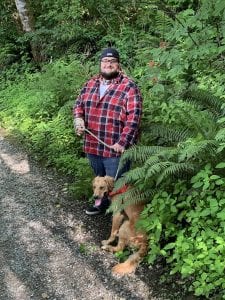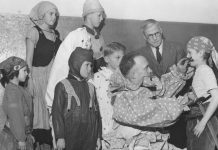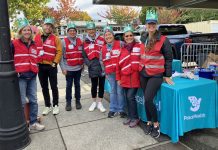With so many people throughout our community in need of help, it’s encouraging to see organizations working to get them in touch with people offering exactly that. Whatcom County’s Mobile Crisis Outreach Team is one method used by Bellingham’s Compass Health to bridge the gaps between services and the people who need them most.
Brandon Foister is the director of crisis response and stabilization for compass health, where he’s worked for seven years. “I started with what was then Whatcom Counseling and Psychiatric, as a mental health professional in the Whatcom County Jail,” he says, “and I was a designated crisis responder in Whatcom County.”
In the years since doing that work, a whole new way to reach out came into being.
“The creation of the Mobile Crisis Outreach Team (MCOT) really started with the transition to managed care within our mental health system,” says Foister.

Before the MCOT program, there were two teams that dealt with crisis: one responded to people who called for help themselves, and another to people who needed more of an intervention. “One of the things we decided to do was combine the teams and create a more seamless service delivery through the system.”
Amy Pereira serves as Compass Health’s associate director of crisis response and stabilization. After supervising some of the various teams that existed before the current program began, she helped implement changes to the new system, which provides a more custom-tailored response to each call.
“We really look at how someone self-defines their crisis, so each situation could be very different,” Pereira says. If someone is starting to deteriorate and things just aren’t going well, they can call for a team that will go out and meet them where they’re at and deal with their current situation. “It doesn’t have to be somebody that has established services with us. Anyone in the community, that lives in the county, can call and have somebody respond to them.”

The team can be reached through the Crisis Cares line, a dispatch managed by the Volunteers of America. Information is available on their website, and anyone needing assistance is welcome to call 1-800-584-3578. They’re also happy to hear from area residents who would like to donate to support their cause.
The outreach team focuses on marginalized community members with hopes to divert them out of trouble and into the care they need. “We work on meeting the needs of what I would define as historically under-served communities, whether we’re talking about their location in the county, their mental health status, even potentially their ethnicity,” says Foister. “We’re working to keep individuals out of the emergency departments and jails by assessing the situation and giving the appropriate referrals.”
With so many people needing so many services, the team has created a network of allies. “We’re working in direct communication with law enforcement. An officer can call the team directly and speak with a team member to coordinate a response, whether it’s the team going out after the fact, or meeting them on scene,” Pereira says. “One of the partnerships that we’ve had is with PeaceHealth, and we work really closely alongside Whatcom Treatment Center, Pioneer Human Services, even with Compass Health Outreach, just to get people connected with services.”

There is one group in particular they’d like to share the spotlight with. “The folks with the GRACE Program are working to create a ground-level, coordinated response for folks in our community that might be a little more difficult to engage,” Foister says. The program offers intensive service to some complicated health cases. “They’re doing a really challenging job, but I think it’s a really important thing for the community and we’ve had a lot of success.”
With successful partnerships and financial aid from the public, the team is happy to continue making a difference, one phone call at a time. “The biggest way to support us is just to keep us busy,” Pereira says. “MCOT is available to serve the local community, and it’s for anybody in Whatcom County. We deal with people from birth until death, all ages are welcome, all income levels. It doesn’t matter if you have insurance or not, you’re not going to get a bill for it.”

“The situations that kind of get to us are those moments where we’re working with someone out in the community—whether it’s someone that our responders are coming across in a homeless camp, or someone we work with in the emergency department—and it turns out that they’ve been in crisis for some time,” Foister says. “They had no idea that we were out there, and they say ‘I wish I would have known about you guys sooner.’ We just really appreciate the opportunity to get that information out there.”






































